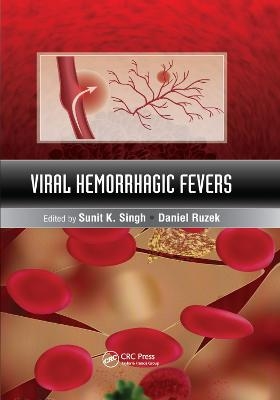
Viral Hemorrhagic Fevers
CRC Press (Verlag)
978-0-367-37979-7 (ISBN)
Topics include:
A historical perspective and information on pathogenesis and immune responses
Animal models, which are critical to the development of vaccines and therapeutics
The roles of high-containment facilities and specially trained scientists in research
Prevention and control, including diagnostics and vaccine development
Old World Lassa and Lujo viruses and the New World Junin and Machupo viruses
Guanarito viruses and their cellular receptors
Bunyaviruses, including Rift Valley Fever, Crimean– Congo hemorrhagic fever, and hantaviruses that cause hemorrhagic fever with renal syndrome
The Ebola and Marburg filoviruses
Flaviviruses, including dengue fever, yellow fever, Kyanasur Forest, Alkhurma, and Omsk hemorrhagic fever viruses and other flaviviruses with hemorrhagic potential
Virologists, clinicians, biomedical researchers, microbiologists, and others needing a rapid overview of the nature of these illnesses will find this book an essential resource on clinical and basic science aspects of many viral hemorrhagic fevers. The book will also provide researchers with a springboard to further inquiry in combating what has become a major global threat.
Dr. Sunit K. Singh is a scientist and leads a research group in the area of neurovirology and inflammation biology at the prestigious Centre for Cellular and Molecular Biology, Hyderabad, India. His main areas of research interest are emerging and re-emerging viral infections, neurovirology, inflammation biology, and immunology. Dr. Singh has received several awards, including the Skinner Memorial Award, Travel Grant Awards, NIH-Fogarty Fellowship, and Young Scientist Award. He is associated with several international journals of repute as an associate editor and editorial board member. Dr. Daniel Růžek is a head of the Department of Virology and head of the Research Group on Emerging Viral Infections at the Veterinary Research Institute, Brno, Czech Republic; a research scientist at the Institute of Parasitology, Academy of Sciences of the Czech Republic; and an assistant professor in the University of South Bohemia, České Budějovice, Czech Republic. His primary field is virology with a research emphasis on vector-borne viruses, especially tick-borne encephalitis virus, Omsk hemorrhagic fever virus, dengue virus, and West Nile virus. In 2009, he was awarded the prestigious international Sinnecker–Kunz Award for young researchers.
General Aspects. Viral Hemorrhagic Fevers: History and Definitions. General Disease Pathology in Filoviral and Arenaviral Infections. Interaction of the Host Immune System with Hemorrhagic Fever Viruses. Vascular Endothelium and Hemorrhagic Fever Viruses. Vascular Endothelial Dysfunctions: Viral Attack and Immunological Defense. Animal Models of Viral Hemorrhagic Fevers. Role of Rodents and Bats in Human Viral Hemorrhagic Fevers. Biosafety Issues and Clinical Management of Hemorrhagic Fever Virus Infections. BSL4 Workforce Preparedness in Hemorrhagic Fever Outbreaks. Major Strategies for Prevention and Control of the Viral Hemorrhagic Fevers. Practical Considerations for Collection and Transportation of Hemorrhagic Fever Samples. Laboratory Diagnosis of Viral Hemorrhagic Fevers. Vaccine Research Efforts for Hemorrhagic Fever Viruses. Specific Infections. Pathogenic Old World Arenaviruses. Lassa Fever. Lujo Virus Hemorrhagic Fever. Receptor Determinants of Zoonosis and Pathogenesis of New World Hemorrhagic Fever Arenaviruses. Argentine Hemorrhagic Fever. Bolivian Hemorrhagic Fever. "Venezuelan" Hemorrhagic Fever. Rift Valley Fever Virus and Hemorrhagic Fever. Crimean–Congo Hemorrhagic Fever Virus. Hemorrhagic Fever with Renal Syndrome. Infection. Marburg Virus Disease. Dengue Hemorrhagic Fever. Yellow Fever Virus Infection. Kyasanur Forest Disease. Alkhurma Virus Hemorrhagic Fever. Omsk Hemorrhagic Fever. Index.
| Erscheinungsdatum | 01.10.2019 |
|---|---|
| Verlagsort | London |
| Sprache | englisch |
| Maße | 178 x 254 mm |
| Gewicht | 1120 g |
| Themenwelt | Studium ► Querschnittsbereiche ► Epidemiologie / Med. Biometrie |
| Studium ► Querschnittsbereiche ► Infektiologie / Immunologie | |
| ISBN-10 | 0-367-37979-1 / 0367379791 |
| ISBN-13 | 978-0-367-37979-7 / 9780367379797 |
| Zustand | Neuware |
| Haben Sie eine Frage zum Produkt? |
aus dem Bereich


